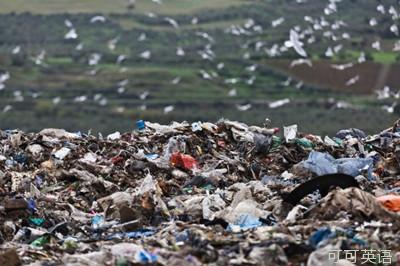Books and Arts; Book Review;Our love of garbage;Rubbish heaps;
文艺;书评;我们对垃圾的爱;成堆的垃圾;
Garbology: Our Dirty Love Affair With Trash. By Edward Humes.
《垃圾学:我们对垃圾非常感兴趣》,Edward Humes 著。
Although it is the buried tombs and the lost cities that get all the press, one of the most valuable things that an archaeologist can dig up is rubbish. Palace murals and heroic statues record the sanitised, official version of history, but a society's garbage tells the true story of how its members lived.

虽然深埋的古墓和迷失的城市占据了所有的新闻版面,但是垃圾,却是考古学家们最值得深挖的东西。宫廷壁画,英雄雕像,那些记录的都是一尘不染的东西,是历史的官方版本,但是,一个社会的垃圾讲述的却是实实在在的市民生活。
With that thought in mind, archaeologists of the future are in for a treat. The industrial societies of the world's developed countries are the most wasteful ever, their spoor turning up in every corner of the Earth. Almost by definition, waste is something that most people prefer not to think too much about. But Edward Humes, an American journalist, is fascinated by the stuff. “Garbology” is his attempt to make sense of our historically unprecedented readiness to throw things away.
这样想来,我们确实是好好地款待了那些未来的考古学家们。因为处于工业社会的发达国家,他们制造了有史以来最多的垃圾,地球上的每个角落都有他们的足迹。很显然,大多数的人是不怎么会深思垃圾这类东西的。但是爱德华休姆斯,一位美国记者,却对垃圾如此着迷。他试图通过“垃圾学”,搞清楚我们为什么会及其相当之非常愿意扔东西。
The book begins at the Puente Hills landfill, an artificial mountain near Los Angeles. It is the biggest dump in America, 30 years old, 150 metres high and containing 130m tonnes of rubbish within a 700-acre footprint. If it were a building, it would be among the 20 tallest in the city. Building a rubbish pile is, it turns out, surprisingly high-tech. The mountain is a giant, putrid layer-cake, with dozens of strata of rubbish separated by soil and plastic liners designed to contain the brew of noxious chemicals that would otherwise leach into groundwater. The rot produces methane, which is collected via a network of pipes that penetrate the mountain, and burned to produce electricity.
本书以朋地山垃圾场开头,朋地山垃圾场,靠近洛杉矶,大得看起来像一座假山。是美国最大的垃圾堆,30岁高龄,150米高,1.3亿吨,700英亩。假如它是一座建筑物的话,那就能名列该城市前20名了。建一座拉一堆可不是易事,事实证明,技术含量出奇的高。这座大山犹如一个腐烂的大蛋糕,几十层的垃圾,由土和塑料管隔开。设计塑料管的目的,是为了防止变质中的有毒化学物质浸入地下水。腐烂物产生沼气,经由管网收集,管网贯穿大山之中,然后燃烧发电。
From there, Mr Humes traces the history of garbage in America, beginning with New York's “White Wings”, an army of municipal rubbish collectors created to clean the city's stinking streets in the 19th century, through the heyday of backyard incinerators (and the smog they produced) to the modern day, where the most common solutions often involve burying the stuff in the ground or dumping it in the sea. He talks to the researchers who are chronicling the plasticisation of the oceans, a swelling suspended solution of pulverised plastic. And he describes the Great Pacific Garbage Patch, an enormous expanse of the Pacific Ocean where currents concentrate the trash over a continent-sized area.
休姆斯先生从那里去追溯美国的垃圾历史。先从纽约“白翼”开始,纽约“白翼”指的是19世纪,为了清扫臭气熏天的街道,市里成立的专门用于收垃圾的群体。之后是后院焚烧炉活跃期(还有焚烧炉产生的烟雾)。再后就是如今,最普遍的垃圾处理方法莫过于地下掩埋或是倾倒大海。休姆斯先生与从事海洋塑化记录的研究员一起,谈论那悬而未决的、了不起的粉末塑料解决方案。他说,太平洋垃圾带,使太平洋体积膨胀变大,水流将垃圾集中到一起,大小有陆地那么大。
The author is just as interested in the creation of rubbish as its disposal. But whereas few will disagree with the gist of his observations about the shortcomings of our modern, disposable, consumer culture, the analysis is rather superficial. Mr Humes comes close to blaming a single man—J. Gordon Lippincott, an industrial designer—for the creation of the entire wasteful model of modern consumerism. And although it is understandable that an American author should write a book looking mostly at the problems of America, it nevertheless feels like a missed opportunity. Some of the most interesting parts of the book come towards the end, where he discusses some of the possible solutions—such as Denmark's strategy of burning rubbish to produce electricity, or an Irish scheme to charge shoppers for plastic bags, which led to a 90% drop in their use. Food for thought, and more.
这位作者对垃圾的产生与对垃圾的处理一样感兴趣。但是他的言论宗旨,即我们现代的、一次性的消费文化缺陷,虽然很少有人反对,可是依然很肤浅。休姆斯先生几近于只责备一个人——杰戈登利平科特,工业设计师——创造了整个奢侈的现代化消费模式。作为一个美国作者,主要写当下美国发生的问题,是可以理解的,可是这总还是会让人觉得缺少了点什么。一些最有趣的部分放在了最后,像关于垃圾问题的可行的解决方案——丹麦焚烧垃圾发电,或是爱尔兰人对塑料袋收费计划,降低了对塑料袋90%的使用。发人深思,意味深远,超出你的想象。



